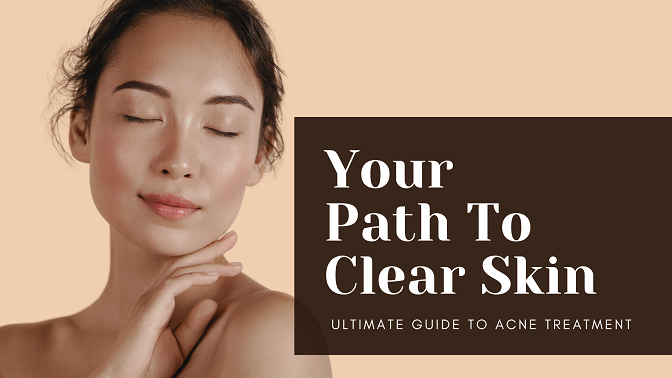
Table of Contents
The Ultimate Guide to Acne Treatment : Your Path to Clear Skin
Dealing with acne is no joke. Those pesky pimples, cysts, blackheads, and whiteheads always seem to pop up when you least expect them—right before a big event or after a stressful day. If you’re someone who’s been dealing with acne for a while, or even just recently, you know the struggle is real. Renora Clinic is a haven for those seeking expert care in managing and treating acne.
In this comprehensive guide, we’ll take you through the various acne treatment options at Renora Clinic and explore how you can finally get the clear, glowing skin you’ve been dreaming of. Whether you’re dealing with hormonal acne, cystic acne, or the aftermath (acne scars), Renora Clinic has a solution for you.
Understanding Acne: What Really Causes It?
Before diving into treatments, it’s essential to understand what acne is and why it happens. Acne forms when your hair follicles become clogged with oil, dead skin cells, and sometimes bacteria. These blockages lead to inflammation and can manifest in different forms :
- Whiteheads : Closed clogged pores
- Blackheads : Open clogged pores
- Pimples : Small red bumps with pus
- Cysts : Large painful lumps beneath the surface of the skin
There are numerous factors that contribute to the development of acne :
- Hormonal Imbalance : Particularly common during puberty, pregnancy, and menstruation.
- Diet : High sugar intake or consuming dairy can sometimes exacerbate acne.
- Stress : Stress hormones can trigger acne flare-ups.
- Skincare Products : Certain products can clog pores and cause breakouts.
- Genetics : If your parents had acne, chances are, you might too.
Acne Treatment Options
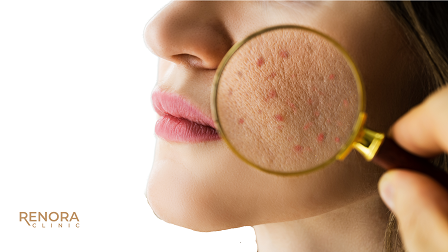
Renora Clinic offers a comprehensive range of acne treatments designed to target the root cause of acne, reduce inflammation, and prevent future breakouts. Let’s dive into each treatment option and what you can expect during your visit.
1. Medical-Grade Chemical Peels
One of the most effective treatments for mild to moderate acne, chemical peels help to remove the top layers of the skin, encouraging cell turnover and unclogging pores. These peels use medical-grade acids, such as salicylic acid, glycolic acid, or lactic acid, to deeply exfoliate the skin.
- How It Works: The chemical peel is applied to the skin for a specific duration, usually 5-10 minutes, depending on your skin type and severity of acne. It helps to lift dead skin cells and debris, unclogging the pores.
- Benefits: Reduces blackheads, whiteheads, and mild pimples. It also improves skin texture and radiance.
- Ideal for: Individuals with non-inflammatory acne, clogged pores, and hyperpigmentation.
2. Topical Medications
Sometimes, acne can be managed effectively with prescription-strength topical treatments. Our aesthetic physicians at Renora Clinic may prescribe retinoids, benzoyl peroxide, or antibiotics to help control acne breakouts and reduce inflammation.
- How It Works: Applied directly to the affected areas, topical medications work to unclog pores, reduce bacteria, and prevent future acne from forming.
- Benefits: Minimal side effects when used correctly, and effective for long-term acne management.
- Ideal for: Mild to moderate acne, especially when combined with other treatments.
3. Oral Medications
For more severe cases of acne, oral medications such as antibiotics or hormonal treatments may be recommended. These treatments help to reduce inflammation and control the production of oil.
- How It Works: Depending on the severity of the acne, oral medications work from the inside to regulate hormones, reduce inflammation, and kill acne-causing bacteria.
- Benefits: Effective for moderate to severe acne, especially when other treatments haven’t worked.
- Ideal for: Individuals with severe, cystic, or hormonal acne.
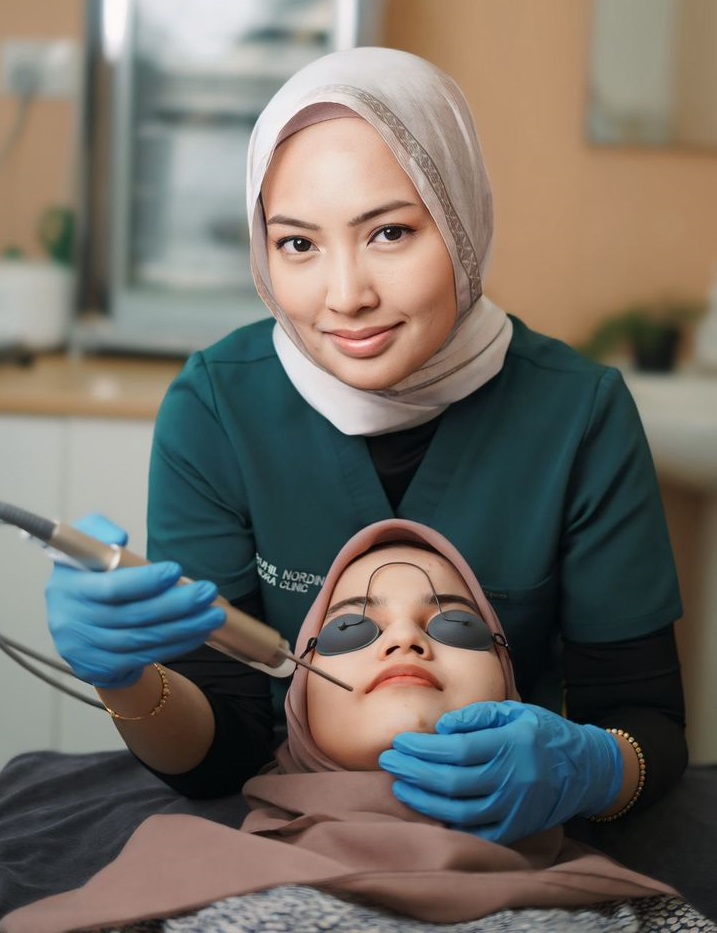
4. Laser Acne Treatments
Renora Clinic offers state-of-the-art laser technology to treat both active acne and acne scars. Fractional lasers and Fotona Lasers target the bacteria that cause acne, reduce redness, and stimulate collagen production to heal scars.
- How It Works: The laser emits light that penetrates the skin to kill acne-causing bacteria and reduce inflammation. It can also target pigmentation from old acne scars.
- Benefits: Reduces acne breakouts, improves skin tone, and stimulates collagen for scar healing.
- Ideal for: Those with cystic acne, active acne, and lingering acne scars.
Cutstomized Acne Treatment Plans
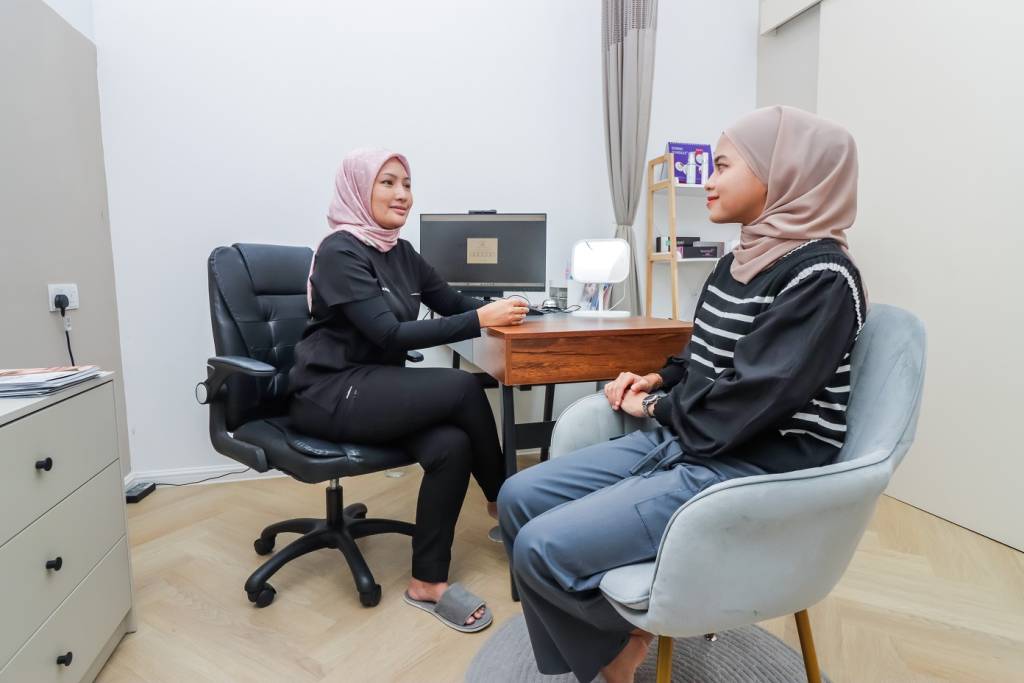
At Renora Clinic, we understand that every individual’s skin is unique. That’s why we offer customized treatment plans tailored to your specific needs. During your initial consultation, our team will evaluate your skin and discuss your lifestyle, diet, and skincare routine to develop the most effective treatment strategy for you.
1. Initial Consultation and Assessment
- Medical History: The dermatologist or skincare professional reviews the patient’s medical history, including any medications currently taken, skin allergies, and family history of acne.
- Skin Analysis: The acne type is assessed (whether it’s mild, moderate, or severe), and whether it involves whiteheads, blackheads, cystic acne, or inflammatory acne.
- Lifestyle & Diet Review: The dermatologist may also evaluate the patient’s lifestyle factors such as diet, stress, skincare routine, and hormonal imbalances.
2. Cleansing and Skincare Routine
- Gentle Cleanser: A suitable cleanser is recommended to clean the skin without stripping its natural oils.
- Exfoliation: Products containing mild exfoliating agents (e.g., salicylic acid) may be prescribed to clear dead skin cells and unclog pores.
- Moisturizers: Despite acne, hydration is key. Non-comedogenic, lightweight moisturizers are typically used.
- Sunscreen: The plan includes sun protection to prevent pigmentation or worsening of acne due to sun exposure.
OFFER
- Renora Skincare Complete Set
- Specially formulated for acne prone skin
- Gentle cleanser, moisturizer and sunscreen for a perfect daily skin routine.
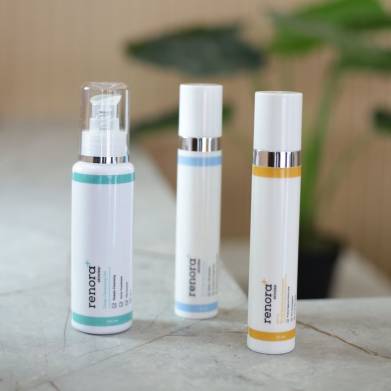
3. Topical Medications
- Retinoids: Often the first line of defense for clogged pores, retinoids help promote skin cell turnover and reduce the occurrence of blackheads and whiteheads.
- Benzoyl Peroxide: Used to kill acne-causing bacteria and reduce inflammation.
- Antibiotics: Topical antibiotics (like clindamycin) may be prescribed to reduce inflammation and bacterial growth.
- Azelaic Acid: For mild to moderate acne, this ingredient reduces swelling, acne bacteria, and dark spots from post-acne hyperpigmentation.
4. Oral Medications (if necessary)
- Oral Antibiotics: Prescribed for more severe, inflammatory acne to reduce bacteria and inflammation.
- Hormonal Treatments: For women with hormonal acne, birth control pills or anti-androgens (like spironolactone) may be used to balance hormones.
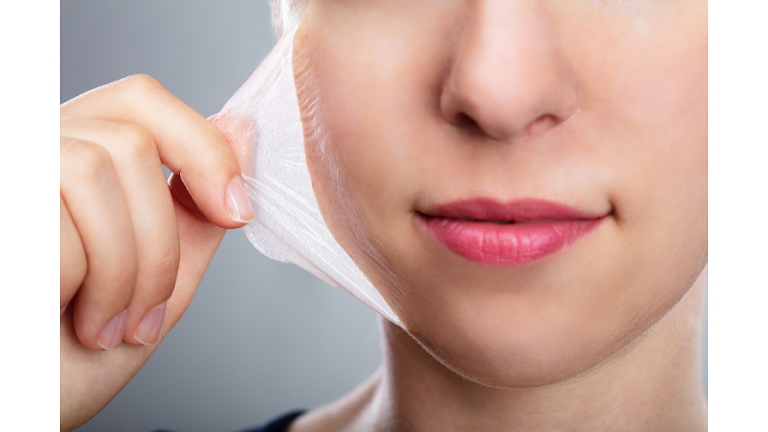
5. Procedures (for severe cases)
- Chemical Peels: Superficial chemical peels containing glycolic or salicylic acid help to exfoliate the skin and reduce the appearance of acne.
- Laser Therapy: Laser treatments target acne bacteria and reduce oil production in the skin.
- Microneedling: This technique is used to treat acne scars and improve skin texture by stimulating collagen production.
- Cortisone Injections: For deep, painful cysts, cortisone injections can rapidly reduce swelling and speed up healing.
- Extractions: Manual removal of comedones (blackheads and whiteheads) might be recommended by a dermatologist.
6. Monitoring and Adjustments
- Regular Follow-ups: Monthly or bi-monthly follow-ups to monitor the effectiveness of the treatment and make any necessary adjustments.
- Adjusting the Plan: The dermatologist may modify medications, treatments, or skincare products depending on the patient’s progress, skin reaction, or any side effects.
7. Post-Acne Care
- Scarring Treatment: Once acne is under control, treatments such as microneedling, dermal fillers, or laser therapy can be introduced to reduce acne scars.
- Pigmentation Management: Hyperpigmentation caused by acne can be treated with brightening ingredients such as vitamin C, niacinamide, or hydroquinone.
8. Long-Term Maintenance
Once the acne is controlled, the patient will often continue a maintenance plan to prevent future breakouts. This usually includes a simplified skincare routine with acne-fighting ingredients in lower concentrations.
KEY CONSIDERATIONS
Patience : Acne treatment takes time, with visible improvements typically seen within 4-12 weeks.
Consistency : Following the prescribed treatment regimen regularly is crucial for success.
Side Effects : Side effects such as dryness, irritation, or sensitivity may occur initially, so proper management by the dermatologist is important.
BEFORE AND AFTER IMAGES
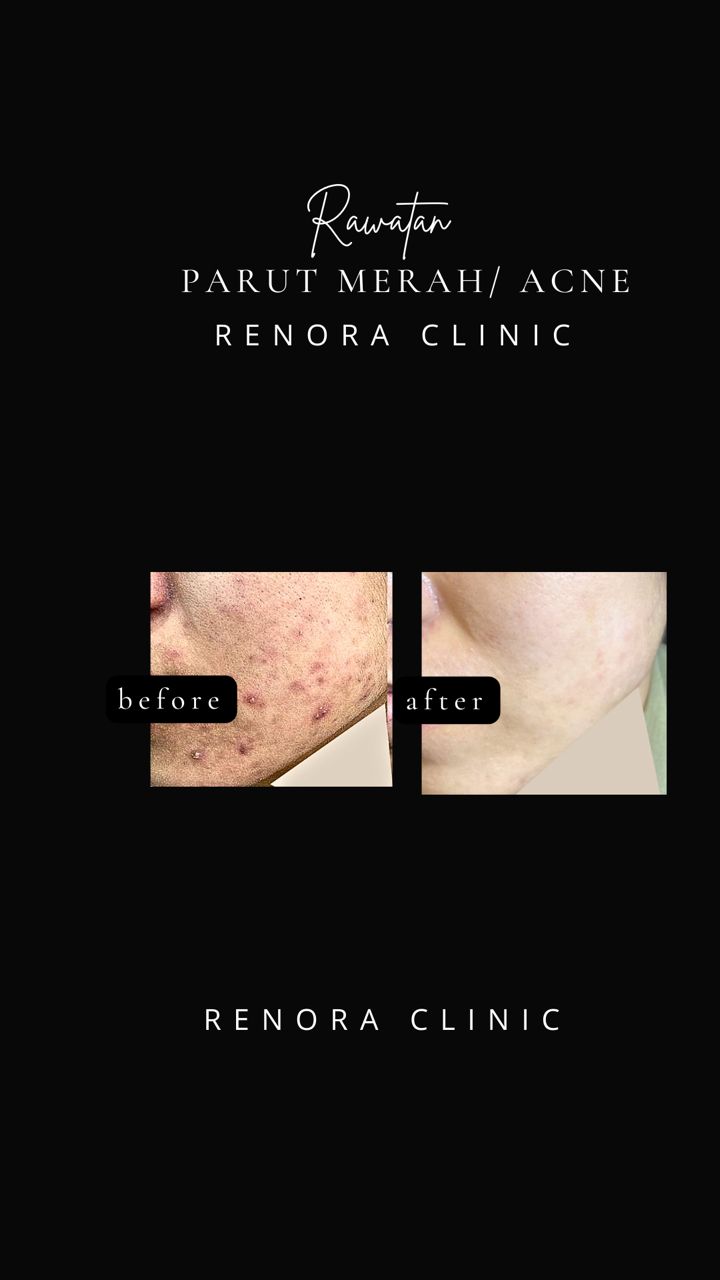
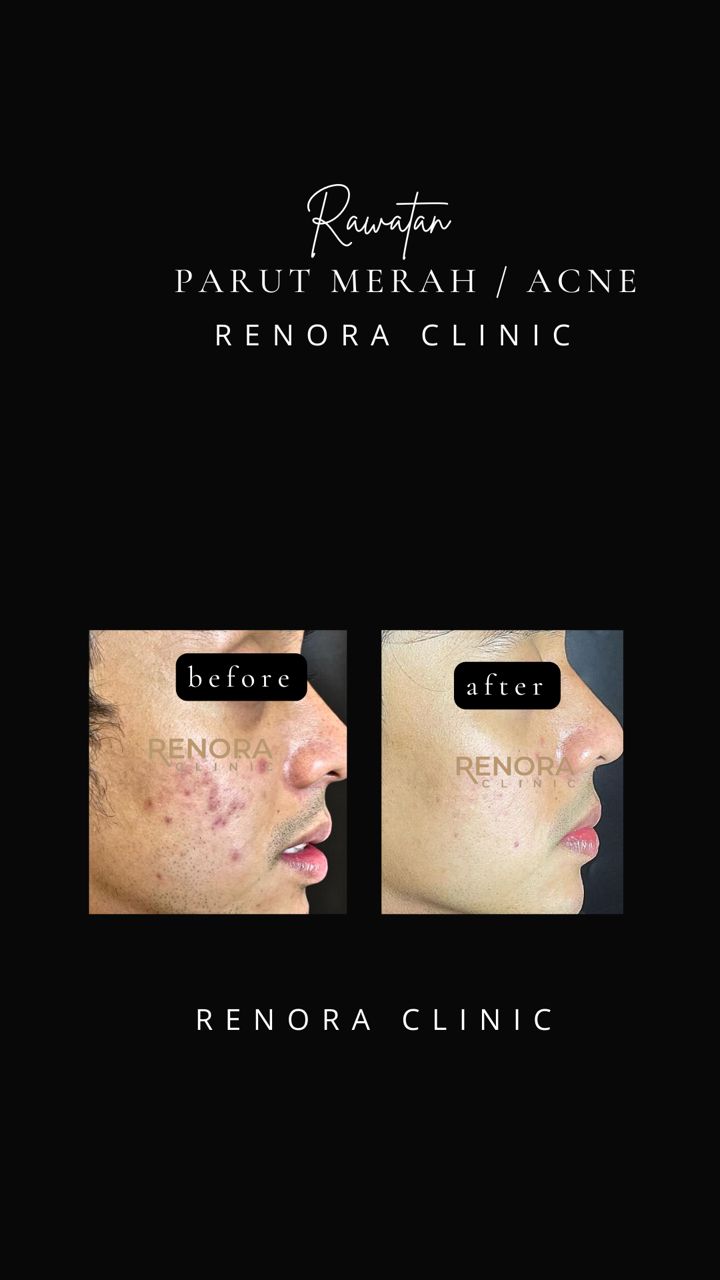
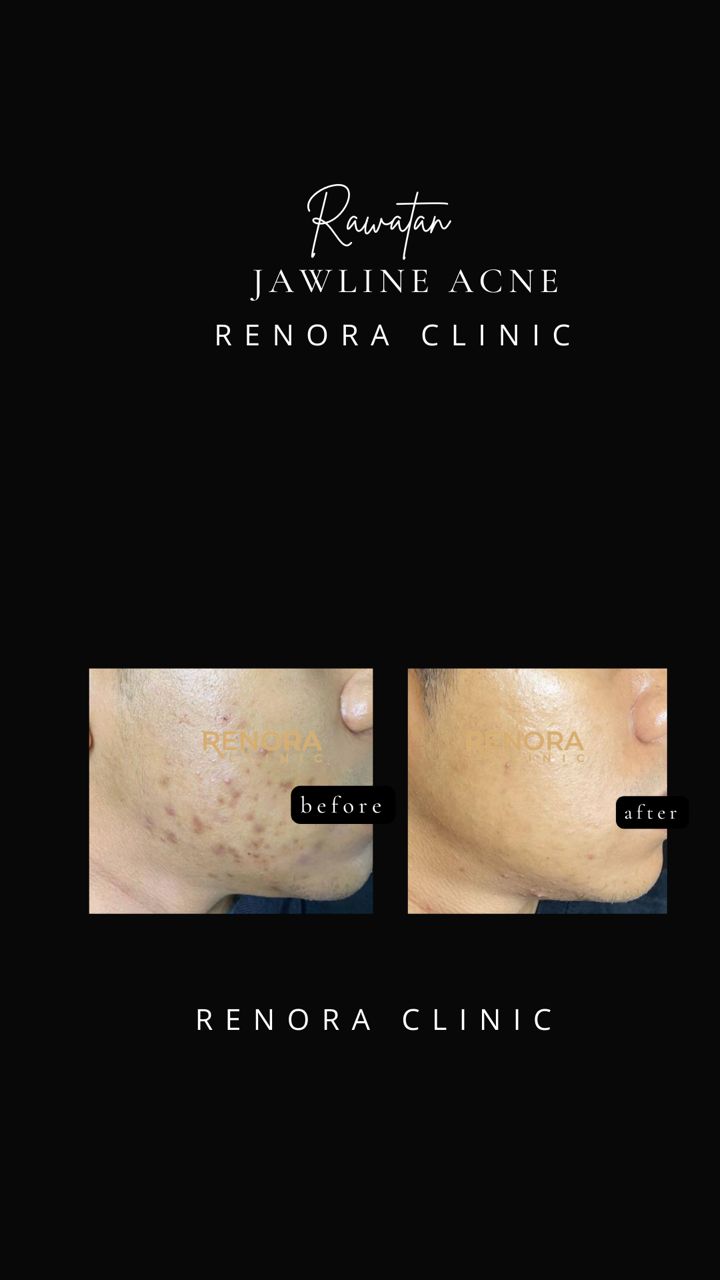
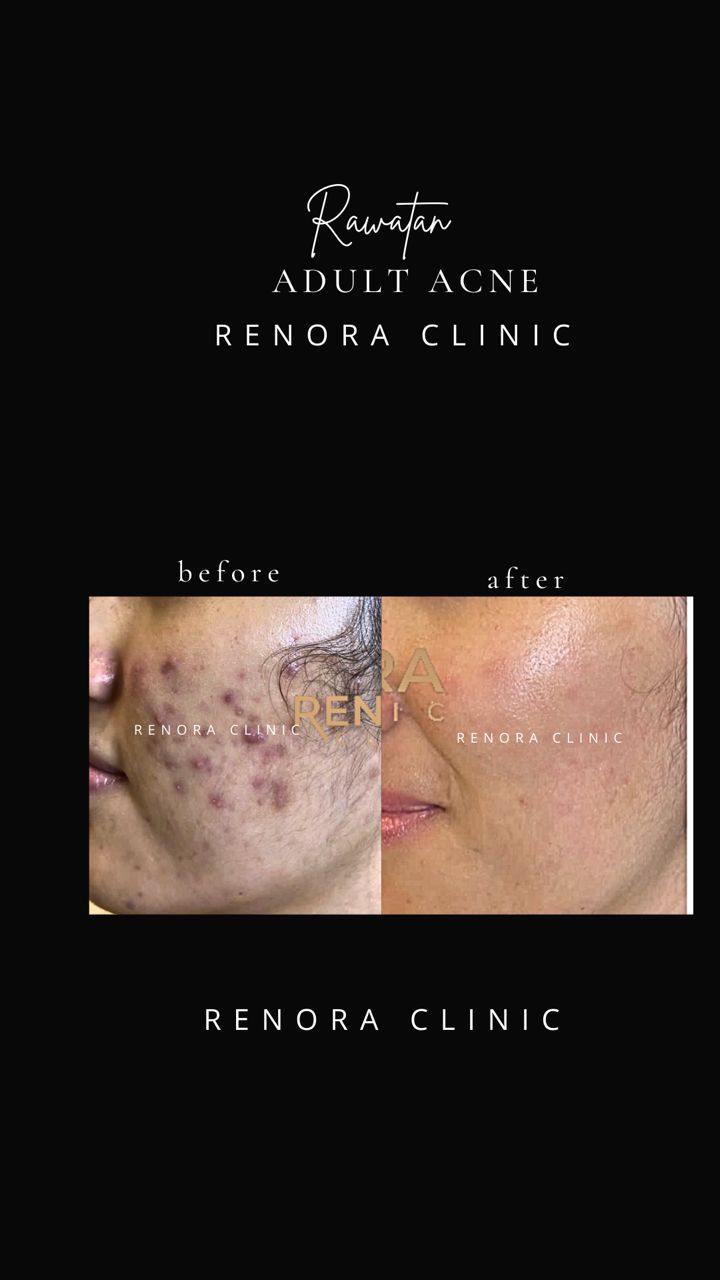
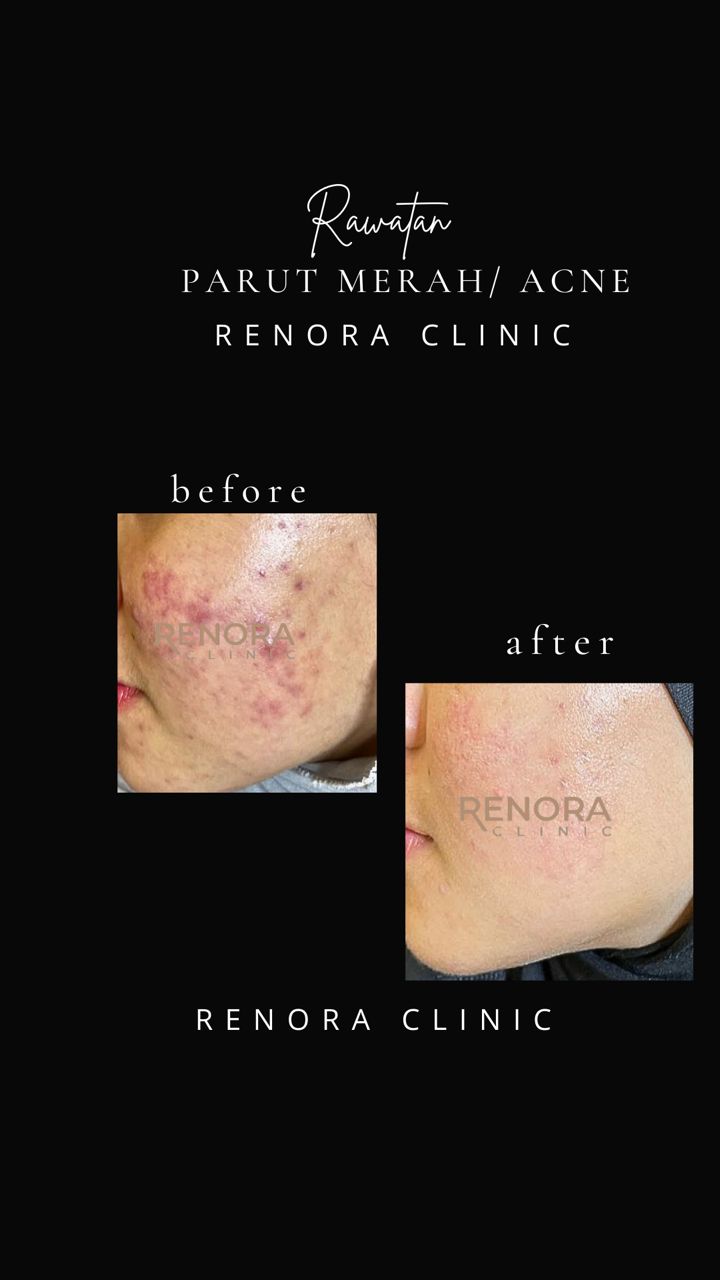
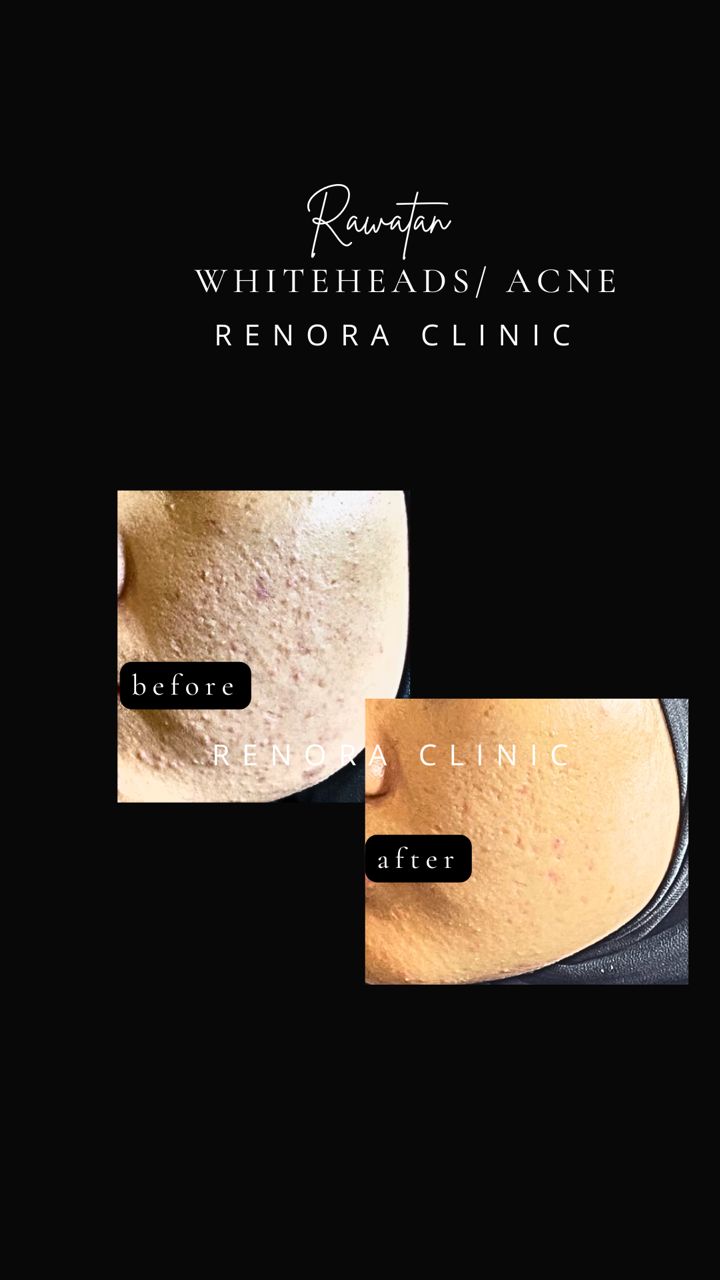
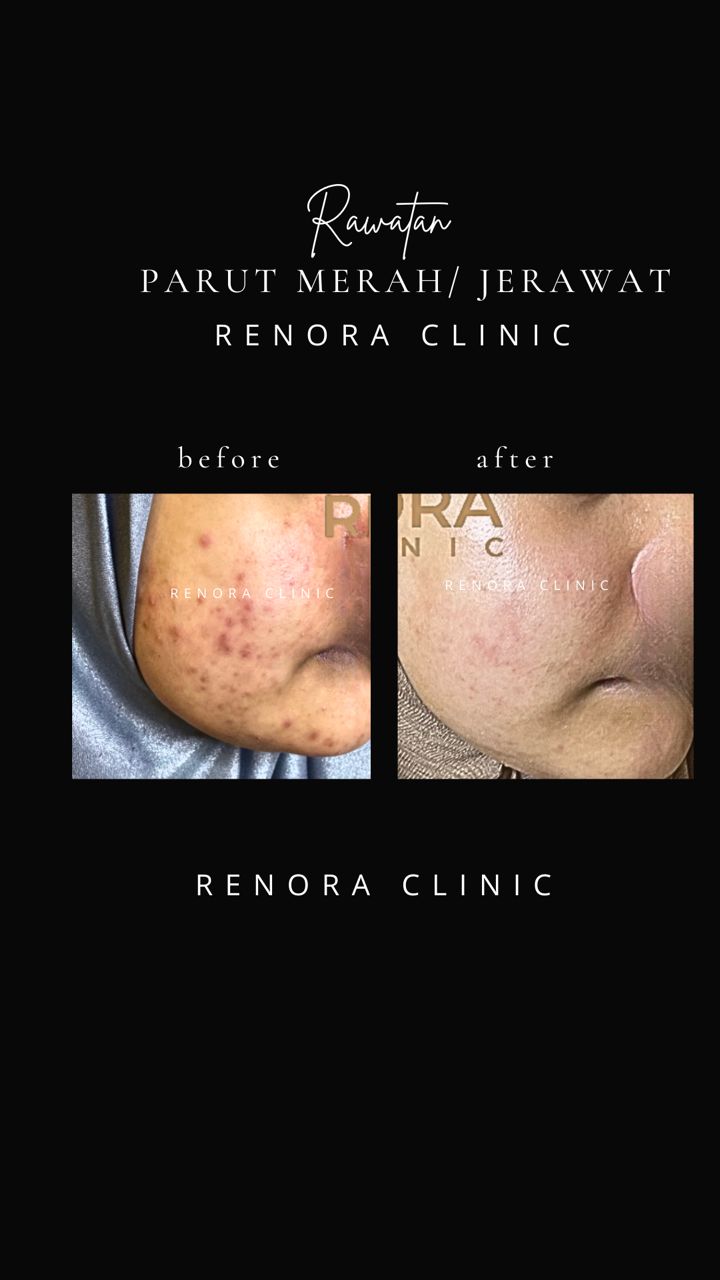
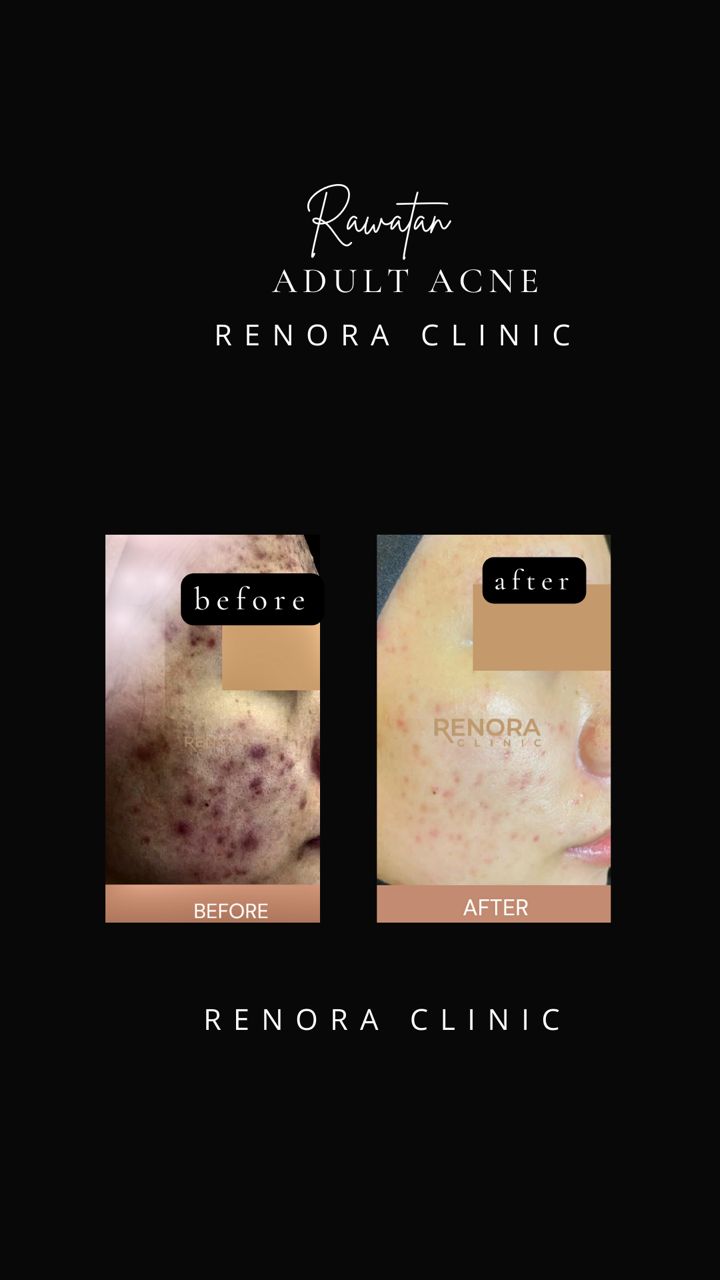
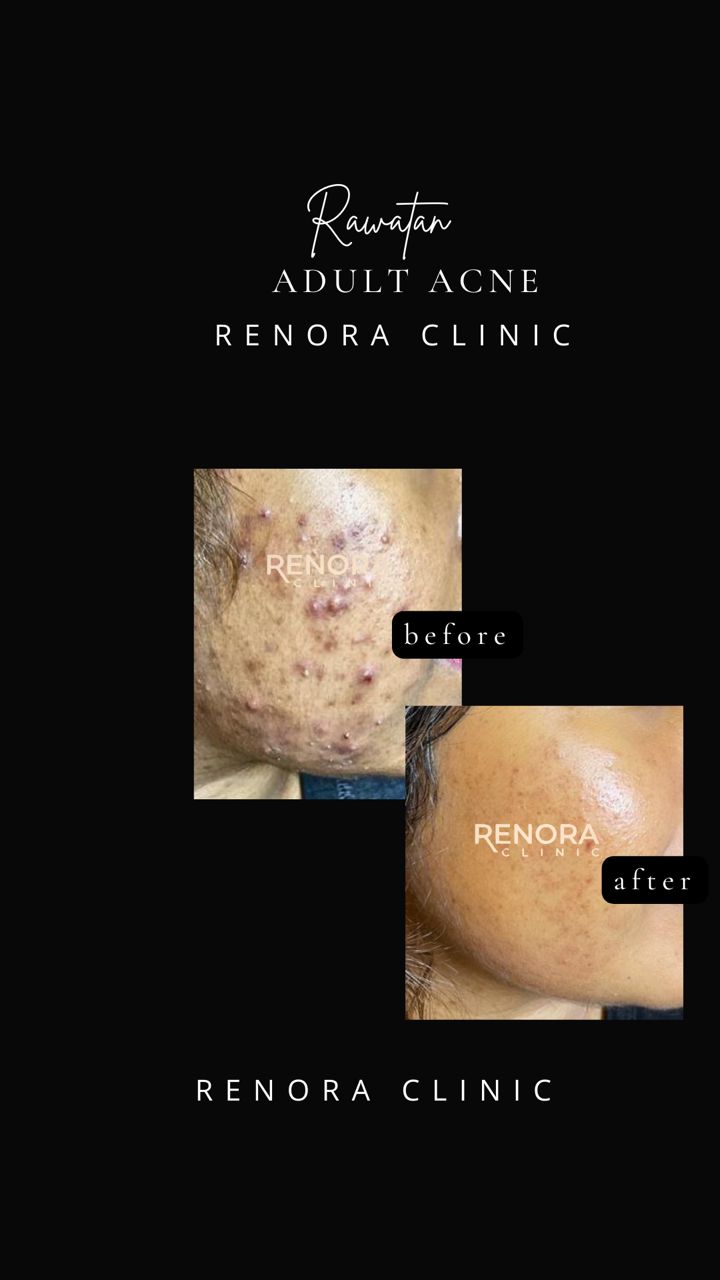
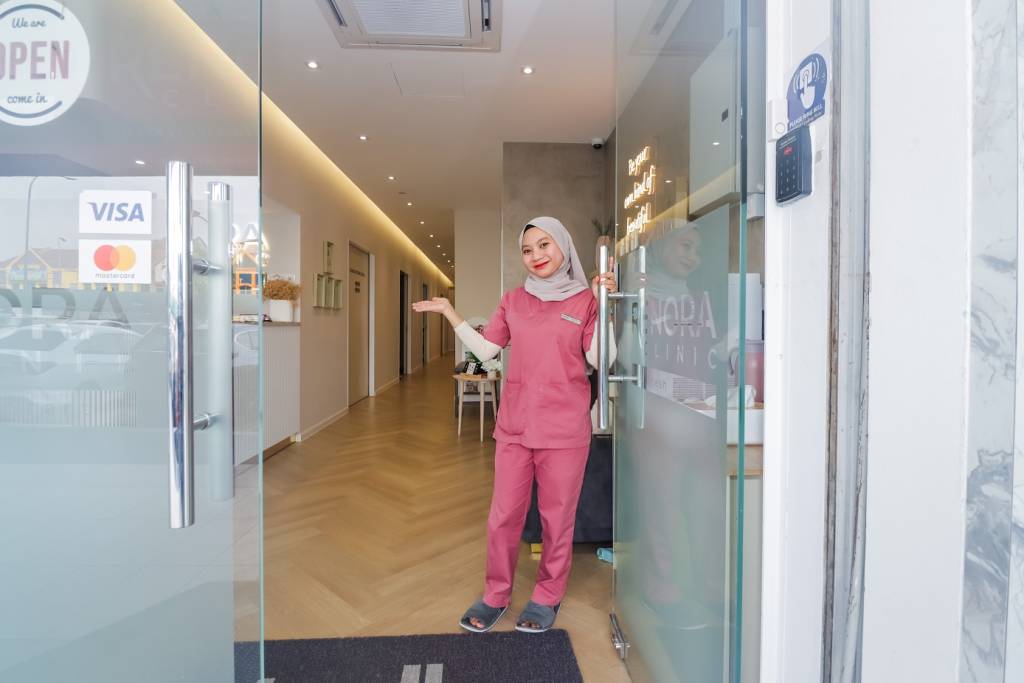
Contact Us Now
Ready to take control of your skin and say goodbye to acne? At Renora Clinic, our expert dermatologists provide personalized acne treatment plans designed to address your unique skin concerns and restore your confidence. Whether you’re dealing with mild breakouts or more severe acne, we’re here to help you achieve clear, healthy skin.
Book your consultation today and let us guide you on the path to radiant, acne-free skin!
Call / Whatsapp us at 011-60988315 or visit www.renoraclinic.com to schedule your appointment.
Your skin transformation starts now!
FAQ
Renora Clinic treats all types of acne, including blackheads, whiteheads, cystic acne, nodules, and inflammatory acne. The clinic’s aesthetic doctors customize treatment plans based on the severity and type of acne each patient has.
Results vary per patient, but most start to notice improvements within 4 to 12 weeks. The timeline depends on the severity of the acne and how closely the patient follows the treatment plan.
Renora Clinic offers a wide range of treatments, including topical and oral medications, chemical peels, laser therapy, microneedling, extractions, and cortisone injections. Each treatment is tailored to the patient’s specific skin needs.
Yes, a consultation is essential. During the initial visit, a dermatologist will assess the patient’s skin, review their medical history, and create a customized acne treatment plan.
Yes, Renora Clinic specializes in treating both adult acne and teenage acne. For adult acne, which often has hormonal causes, the clinic offers hormonal treatments such as anti-androgen medications and skincare products suitable for mature skin.
Yes, Renora Clinic offers treatments that not only target active acne but also help reduce the appearance of acne scars. Procedures like microneedling, laser therapy, and chemical peels are available for scar reduction.
Yes, each patient’s skin type and sensitivities will be carefully evaluated. Treatments are customized to ensure they are safe and effective, minimizing irritation while protecting the skin’s natural barrier.
The cost varies depending on the severity of the acne and the specific treatments recommended. After the initial consultation, the clinic provides a detailed cost breakdown for the personalized treatment plan.
Yes, follow-up appointments are important to monitor progress and adjust the treatment plan if necessary. Monthly follow-ups are typically recommended to achieve the best results.
Maintenance treatments may be recommended to prevent future breakouts. This could include a simplified skincare routine, regular visits for treatments like chemical peels, and the continued use of prescribed topical products.
Yes, installment payment is available through selected credit card banks and Atome. We also accept payments via credit cards, debit cards, and QR code.
